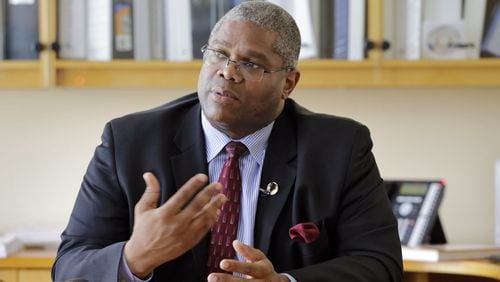DeKalb County officials underreported the number of times sewage overflowed into creeks and rivers, possibly violating a judge's order, according to an investigation's findings released Tuesday.
The county failed to report spills from manholes and pipes that polluted waterways 35 times over the last four years, which it is required to do as its aging water and sewer systems receive a $1.35 billion upgrade. The county government could face fines from the U.S. Environmental Protection Agency.
In all, DeKalb had 555 sewage spills from 2012 to 2015, according to the county's revised figures. The spills that weren't previously reported represents 6 percent of the total.
“We didn’t get it right,” said DeKalb Chief Operating Officer Zach Williams. “The fact that we did not report to the extent that we should have, not only was that problematic, it necessitated corrective action.”
The county in April acknowledged underreporting spills, fired an assistant director and ordered an investigation managed by outside companies CH2M Hill and Joe Tanner & Associates. DeKalb is also retraining watershed employees.
Some still questioned whether DeKalb has solved its spill problems.
Joel Easley, who sees streams of sewage flow through his yard after heavy rains, said he’s still waiting for the county to make needed repairs.
“Sure, it’s progress because they were doing nothing before, but they’re not addressing the issue,” said Easley, who lives in Decatur’s Oakhurst neighborhood. “It’s a matter of time before it happens again.”
Residents should be concerned about sewage continuing to contaminate public waters, said John Miller, a chairman of DeKalb’s citizen advisory committee for water and sewer improvements.
While the number of sewage spills in DeKalb is decreasing, the county is still on pace to record more than 100 spills this year, with 71 reported during the first half of the year, according to documents submitted to the EPA this week. DeKalb had 125 spills last year compared to 156 in 2012.
“If it’s properly managed in the future, I think we’re going to see fewer spills,” said Miller, a retired civil engineer. “Are we ever going to get below 100? I don’t think so.”
DeKalb County and the city of Atlanta are the region’s most troubled areas for sewage spills because of old pipes and facilities that are in desperate need of repair or replacement. In contrast, Gwinnett, with newer infrastructure, has fewer problems. Fulton and Cobb counties fall in the middle.
DeKalb underreported spills because county workers only recorded incidents where they personally witnessed an active spill going into a waterway, Williams said. But the county should have been making spill reports any time there was sufficient evidence that a spill had occurred.
The Georgia Environmental Protection Division and the U.S. Environmental Protection Agency will consider DeKalb’s findings and decide whether to impose sanctions.
“EPD will review the reports with EPA and will determine if any additional penalties are applicable to these spills or reports,” said EPD Watershed Protection Branch Compliance Manager Lewis Hays in a statement.
The EPA declined to comment until after it reviews DeKalb’s reports, said spokeswoman Dawn Harris-Young.
DeKalb Commissioner Nancy Jester said the county has instituted more rigorous reporting procedures that will prevent these kinds of problems in the future.
“I’m disappointed with past actions, but I feel very optimistic going forward,” said Jester, who is overseeing public works and infrastructure for the commission. “I feel like we’ve righted the ship.”
But Easley questions if the county has owned up to all the spills.
DeKalb lists two spills on his property that reached public waterways, along with three other overflows or backups that the county said didn’t contaminate public waters. But Easley said some of the overflows were so severe that they should have been categorized as full-fledged spills.
“I don’t think the numbers are accurate,” he said. “Everything that happened at our place absolutely made it into a public waterway.”
DeKalb sewage spills by year
Year … Originally reported … Revised
2012 … 141 … 156
2013 … 127 … 134
2014 … 136 … 140
2015 … 116 … 125
Source: DeKalb County Department of Watershed Management
About the Author








